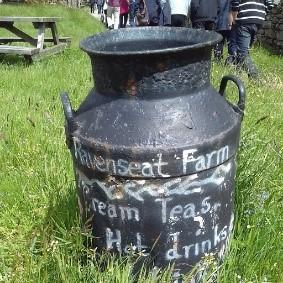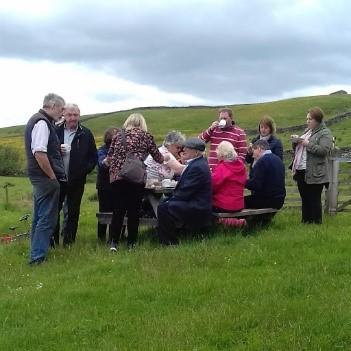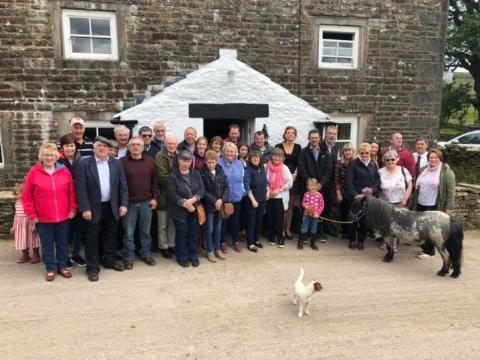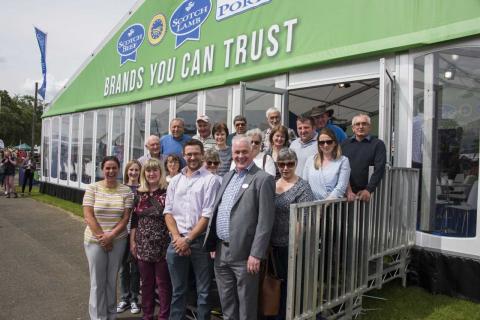Farming Connect Study Visit - Paincastle Discussion Group
Painscastle Discussion Group
Yorkshire and Scotland
21 - 23 June 2019
1) Background
This group consists of mainly members of the Painscastle Buyers Group and a few close acquaintances. The Painscastle Group consists of 45 farms of which the majority are beef and sheep and some have arable land. We have been trading for 25 years and meet every two weeks to decide, discuss and debate what products we intend to buy at this time. We have professional speakers come to lots of our meetings, ranging from vets to animal health companies, advising us the best way forward to help reduce costs but still buying a quality product.
The aims and objectives of the visits were to hear first-hand about the history of the farms we visited and if they faced the same challenges as we do. If so, what have they changed or improved to overcome these challenges? We wanted to explore possible diversification opportunities, whether it be large-scale or small; what changes we could implement and how we can adapt our farm businesses to be more cost effective; to learn more about the farm supporters’ scheme; to understand the benefits of a mixed farming approach; to view the stock at the show and see if maybe introducing some of the Scottish hill breeds would benefit our farming systems; to compare the QMS scheme with ours here in Wales and meet with board members to listen to their experiences and if they needed to change anything with Brexit looming and how they were supporting their farmers in Scotland.
2) Itinerary
Day 1
We set off at 5am from Rhosgoch on Herdman Coaches and made our way up to Chester, where we had an excellent breakfast, which set us up for the day ahead.
Onwards we travelled, left the motorway and went along very narrow country lanes; the roads are not like here at home with hedges each side but well-maintained stone walls. Expertly driven by our coach driver Paul, who ably manoeuvred the coach along these narrow roads, whilst we all just enjoyed the amazing views over the Yorkshire Dales. We soon arrived at our lunchtime destination - Amanda and Clive Owen’s farm. Ravenseat Farm is located some 30 minutes off the beaten track in Swaledale, one of the highest, remotest hill farms in England. The 2000-acre farm has a flock of Swaledale sheep and an assorted range of other animals.
We were met by Clive Owen and his daughter Raven. They were very welcoming and soon served tea and scones to us all. Unfortunately, Amanda, or as some know her, the Yorkshire Shepherdess, was not able to come and talk straight away as she was dealing with a crisis. The police were talking to her as on the previous night they had been unlucky enough to have their quad bike stolen.
Clive talked about the farm and how they have diversified into cream teas and holiday accommodation to supplement their income. He said they are very fortunate to be on one of the most popular footpaths in Yorkshire and so have many walkers coming through the farm.
He talked about the need of good gamekeepers, how they help the environment by keeping predator numbers down, thus allowing nesting birds to lay eggs and raise their young. We saw several curlews and peewits (lapwings) while we were there.
The police left and Amanda joined us telling us about how she is very active on social media and has appeared on TV programmes; The Dales and New Lives in the Wild as well as the Yorkshire Shepherdess. She talks to different groups and also to ministers getting the story of farming life across. She talks about how it is actually done, to show the general public the reality of rural life, and how farming is not like a factory farm, which is sometimes portrayed in the media. She has released two books and awaiting publication of a third which she also sells in her front porch to walkers. On the day we arrived there were several walkers.
We then continued on our journey, stopping for a comfort break at Gretna Green, before arriving at our hotel in Portobello, four miles from Edinburgh.
Lessons learnt on day 1
- It is possible to make a living in a remote area, but you need to work at it
- Look at your surroundings and make the most of your strengths and situation
- Diversification seems the order of the day
- Cream teas are popular if you have footpaths coming through your land
- Environment and country life are very important; it’s about having the right balance, so look at what schemes are out there
- Environmental payments are essential in supporting the family farm to help maintain traditional buildings and keep the landscape unspoilt
- Have farm visits/tours
- Look at more tourism opportunities including B&B
Day 2
Today we set off on our coach to the Highland Show. Once we were in the show, we all familiarised ourselves as to the whereabouts of the stand where we were going to meet with QMS (Quality Meat Scotland) later that morning.
After looking around for an hour or so, we gathered at the QMS stand where we were warmly welcomed with a cuppa. We were very privileged to meet with Alan Clarke, Chief Executive; Kate Rowell, Chair and Doug Bell, Lead of Strategic Engagement. They talked about what they were doing for farmers in Scotland, the support they give them and how the Scottish Minister is very supportive of the different meat schemes including their beef efficiency scheme and beef calf scheme. A very informal, open and relaxed question and answer session followed. So, what did we learn and what knowledge did we gain?
Preparing for Brexit
- Farmers are delaying big investments on farms so spending less
- The timing of Brexit is very worrying as a lot of lamb is exported during winter months
- What will the tariffs be - who knows?
- Working together with all areas of industry to put together all of the facts and as one voice when talking with the Scottish Government
- Hoping to sell the majority of lambs by October
But then again, it is difficult to be properly prepared when we don’t really know the outcomes but what is reassuring to them is that their Minister is listening and working with them.
Overcoming challenges and negative press in the red meat industry
- Media on TV talk a lot about veganism. They overcome this by not challenging it but by giving out positive messages such as the real facts about the benefits of red meat - campaigns like ‘Meat with Integrity’ and ‘Red meat is a good source of protein’
- Sending out facts about how great their industry is and what superior products they have to offer via social media (Twitter/Facebook etc)
- Getting into schools and educating the children; they recently funded putting lamb on the school menus for a month
- 70% of budget is spent on promoting red meat
Lessons learnt on day 2
- Scottish Government work alongside the farmers
- Very little TB
- Beef calf scheme pays farmers £100 per calf reared over 40 days
- Sheep upland scheme pays out on homebred ewe hoggs that are kept on-farm or croft from 1 December in the year claimed to 31 March the following year
- We need to be more vocal and transparent and to work together across sectors as ‘one voice’. We need to talk to our government and make them listen
- Land rental is a lot cheaper
This was a really good meeting with three very knowledgeable and friendly people and really got our day at the show off to a good start.
We then ventured off, visiting the many attractions around the show.
So, how did we all think it compared to our Royal Welsh Show?
- Ours is better organised for getting animals to the ring – a lot of congestion with a barrier system that closes the roadways – the stock is located some distance from the main ring
- They used plastic portable barriers for dividing up the main ring, so more than one thing going on. This made it easy for when they wanted the whole ring e.g. for the grand parades
- Plenty of seating around
- Flatter, easier walking site
- Like ours, good quality stock on show and friendly atmosphere
- Better promotion of Scottish products e.g. Tartans/Tweeds
- Trade stands were more up-market, quite pricey - good to have a variety for all budgets like our show offers
- More variations of machinery, so cater for large and small farms
- Society representatives, at least the ones we met, seemed more approachable and open to conversation. Good communications are so important at these shows.
All in all, a good day was had by everyone.
Day 3
Today we set off for Edinburgh. We couldn’t come all this way and not learn something about the history and culture of this famous city. We were joined by a tour guide who pointed out the cultural sites and talked about the famous people and buildings of Edinburgh.
We then made our way out of the city to Whitmuir Organic Farm, Lamancha. Whitmuir is a 54-hectare mixed organic upland farm located in the Scottish Borders. They rear cattle, sheep, pigs, hens, and turkeys and also grow seasonal vegetables and soft fruits.
We were met by Peter and Heather Anderson who, after quick introductions, signposted us to the café where we were to have lunch whilst they went up the hill to check on a cow calving.
After lunch, Peter joined us and an interesting question and answer session followed. He told us how he had bought the farm at the time of foot and mouth which was a difficult time in farming. He couldn’t stock straight away, and as they had no prior land or animals, they had no subsidies allocated to them. They both kept working and slowly built the farm up, trying different options to see what paid best.
In 2006, they built a small farm shop and butchery and started a farm supporter’s scheme (make regular monthly payments to the farm in exchange for food.) The business has expanded and they now have a much larger shop and an online store. They are currently employing over 27 people.
Lessons learnt on day 3
- It is possible to make a living from organic agriculture, but it needs a lot of hard work and commitment to succeed
- Need to supplement it when starting off - a second income
- Unable to make a living from 140 acres alone without having to diversify as 30 acres were in trees
- Need to consider your location when diversifying to a farm shop or café; is it on a main road, easily accessible, within walking distance and cost effective for workers to get to and customers?
- Organic consumption seems to be increasing in Europe but not in UK
- If you want to keep pigs, check your soil conditions as his is of very heavy clay and when it gets wet it takes a long time to recover
- If you grow vegetables, they are more productive in polytunnels as less chance of disease
- Organic food is very expensive
- Think about the sprays we use on arable crops, and look at alternative ways without damaging the environment
- Have a balance on your farm; set aside some areas to help the environment e.g. wild flower meadows to reintroduce wild flowers and insects
- Grow your own and sell surplus at the farm gate or local farming markets or to local B&Bs
3) Next Steps
During our three days we gained a lot of useful information, and on the way home the members talked about the different things we need to look at and the possibilities that are out there that we can take on board.
Several are thinking of looking into ways to diversify through tourism, bed and breakfast, cream teas, bacon rolls etc as a lot of us are in rural locations and have footpaths and bridleways running through our land.
We need to ensure we stand together as a farming community and get the message out there about how good our products are.
Actions going forward
- Feedback our findings to the wider group at the next meeting
- Need to talk to the Unions, meat processors, butchers and get them to promote British food
- Arrange a follow up meeting with QMS when they visit the RWAS
- Arrange to talk or visit a larger organic producer farm
- Look at what funding is available to support tourism opportunities
- Look at direct marketing opportunities
- Invite a representative from Welsh Government to attend a meeting to discuss why Scottish farmers are getting support for their animals, when all we want is a level playing field, as all competing in the same market
- Ask Amanda and Clive Owen to come to one of our meetings when they next attend the Hay Festival – they are very interesting and inspiring speakers
- Meet with Hybu Cig Cymru (HCC) to put forward some of the things QMS are doing with their farmers; see if they can unite with other bodies to form ‘one voice’ for our industry.




